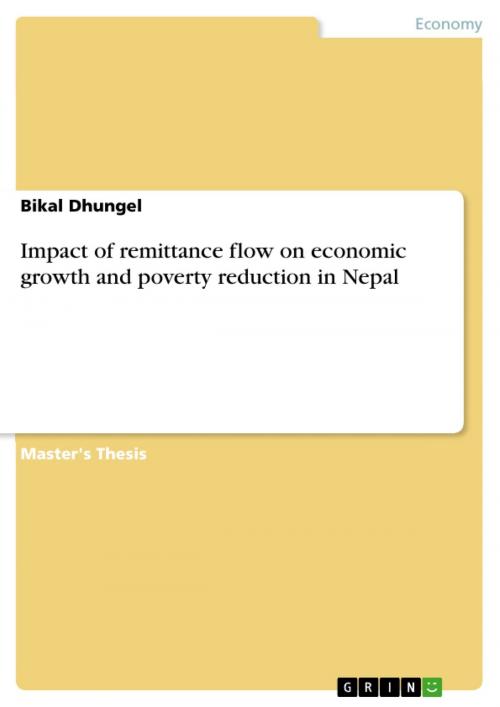Impact of remittance flow on economic growth and poverty reduction in Nepal
Business & Finance, Economics, Urban & Regional| Author: | Bikal Dhungel | ISBN: | 9783668233188 |
| Publisher: | GRIN Verlag | Publication: | June 3, 2016 |
| Imprint: | GRIN Verlag | Language: | English |
| Author: | Bikal Dhungel |
| ISBN: | 9783668233188 |
| Publisher: | GRIN Verlag |
| Publication: | June 3, 2016 |
| Imprint: | GRIN Verlag |
| Language: | English |
Master's Thesis from the year 2015 in the subject Economics - Case Scenarios, grade: Very good, University of Glasgow (Adam Smith Business School), course: Master of Science in Economic Development, language: English, abstract: This research uses time-series data to examine the impact of international remittance flow on economic growth and poverty reduction in Nepal. It applies the econometric model suggested by Ravallion (2001), Ravallion and Chen (1997) and Adam and Page (2005) for remittance and poverty and Quayyum et al (2008) for remittance and growth. Both micro and macro level impacts were considered. The regression results show that remittance flow is positively and significantly correlated with economic growth and poverty reduction in Nepalese context. The finding suggests that in the short run international remittance flow had positive contribution in economic growth and poverty reduction through investments in health, education and consumption. Remittance also contributed to relax credit constraints, especially for the poor and in macro level, helped to finance trade deficit, accumulate foreign exchange reserves and to reduce government debt. However, a deeper analysis of the last two decades shows that increased remittance flow has been the major cause of decline of tradable sector through 'Dutch Disease? effects. Moreover, remittance contributed to higher inflation, eroded work habits and brought adverse social costs. Combined, the long term impact of remittance seems to be overwhelmingly negative in Nepal.
Education: Bachelors in Economics/Business - Technical University of Cologne, Germany Masters in Health Economics - University of Aberdeen, UK Masters in Economic Development - University of Glasgow, UK Summer School in Development & Environmental Economics, London School of Economics, UK
Master's Thesis from the year 2015 in the subject Economics - Case Scenarios, grade: Very good, University of Glasgow (Adam Smith Business School), course: Master of Science in Economic Development, language: English, abstract: This research uses time-series data to examine the impact of international remittance flow on economic growth and poverty reduction in Nepal. It applies the econometric model suggested by Ravallion (2001), Ravallion and Chen (1997) and Adam and Page (2005) for remittance and poverty and Quayyum et al (2008) for remittance and growth. Both micro and macro level impacts were considered. The regression results show that remittance flow is positively and significantly correlated with economic growth and poverty reduction in Nepalese context. The finding suggests that in the short run international remittance flow had positive contribution in economic growth and poverty reduction through investments in health, education and consumption. Remittance also contributed to relax credit constraints, especially for the poor and in macro level, helped to finance trade deficit, accumulate foreign exchange reserves and to reduce government debt. However, a deeper analysis of the last two decades shows that increased remittance flow has been the major cause of decline of tradable sector through 'Dutch Disease? effects. Moreover, remittance contributed to higher inflation, eroded work habits and brought adverse social costs. Combined, the long term impact of remittance seems to be overwhelmingly negative in Nepal.
Education: Bachelors in Economics/Business - Technical University of Cologne, Germany Masters in Health Economics - University of Aberdeen, UK Masters in Economic Development - University of Glasgow, UK Summer School in Development & Environmental Economics, London School of Economics, UK















